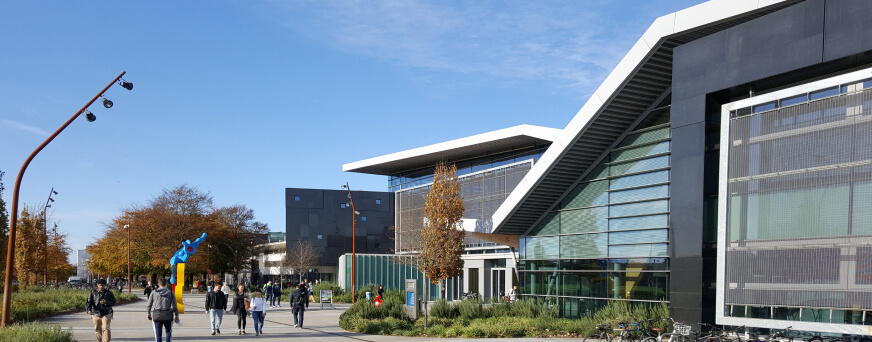Explore University of McCordsville’s Eligibility Criteria for Students Worldwide
High School Diploma, GED Or Equiv. International Education
96 Hours
1 Year (Self-Paced) Program
16
The course explores philosophic and artistic heritage of humanity expressed through a historical perspective on visual arts, music, and literature. Topics include myth, literature, art, music, television, cinema, and the theater. Also discussed are provocative issues in the humanities - religion, morality, happiness, death, freedom, and controversies in the arts.
Social and Cultural Geography considers why geography matters to the analysis and understanding social relations, cultural identity and social inequality. Course examines how social life is structured at a variety of scales with respect to ethnicity, industries, services, urban patterns, and resources of world as a whole.
English Composition provides you with rhetorical foundations that prepare them for academic and professional writing. You will learn the strategies and processes that successful writers employ as you work to accomplish specific purposes. You will develop skills in writing unified, coherent, well-developed essays using correct grammar and effective sentence structure.
College Algebra provides an overview of the fundamental concepts of algebra: an understanding of the general concepts of relation and function; and the ability to solve practical problems using algebra.
World Religions course offers the broadest coverage of world religions as they exist today; helping you understand the ideology behind the many religions that strive today. While it is impossible to cover all religions, it does cover those of the vast majority of people.
Evenly balanced between theory and applications, this course shows you how to establish an ethical theory and how to apply it to a range of specific moral issues. This course examines ethical problems in such areas as mercy killing, personal relations, business, sexuality, medicine, and the environment.
This course introduces the origins and historical development of art. Emphasis is placed on the relationship of design principles to various art forms including but not limited to sculpture, painting, and architecture. Upon completion, you should be able to identify and analyze a variety of artistic styles, periods, and media.
This course provides the mathematical foundation for an introductory calculus course. In addition to a brief review of basic algebra, the course covers equations and inequalities; functions, models, and graphs; polynomial and rational functions; exponential and logarithmic functions; trigonometric functions; and trigonometric identities and equations.
This course is an introductory study of the human body, including the basic structure and function of the major organ systems (nervous, endocrine, circulatory, reproductive, etc.) and the effects of diet, exercise, stress and environmental change on human health.
World History course present the big picture, to facilitate comparison and assessment of change, and to highlight major developments in world's history. This course emphasizes the global interactions of major civilizations so that you can compare and assess changes in the patterns of interaction and the impact of global forces.
The intent is to provide not only an overview of the legal principles in a variety of areas of the law, but also to give a practical introduction to the kinds of duties and responsibilities that a paralegal may face in the workplace.
Using a hands-on approach, this course provides you with an easy and comfortable way to learn about processes, materials, and environment of legal research. It contains an introductory overview of law library collection, allows you to conduct research without visiting an actual library, and explains many methods of legal research.
This course builds the procedural knowledge and real-world skills needed for today’s paralegal. It places an emphasis on profession and skills. Places an emphasis on basic foundations including: developing critical thinking and procedural skills; learning about technology applications in law office; and understanding how to handle ethical situations in workplace.
Primary objective of this course is to make you understand the field of paralegals. Career of a paralegal, the court system, legal ethics, typical paralegal functions in law firms, legal research and writing, interviewing clients and witnesses, and using computers in practice of law are the highlights of this course.
This course provides a step-by-step overview of essential legal principles associated with each phase of operating a business; from inception to dissolution. Knowledge of the legal principles behind the making of contracts, fundamentals of employment law, is essential for you Understanding intellectual property rights will help build and protect businesses.
This course builds a strong foundation in technology concepts, applications and vocabulary so you are prepared to work effectively in today’s law office. It describes basic computer concepts as well as more complex skills and software programs with coverage and assignments for Word, Excel, Adobe Acrobat, and more.
| Tuition Fee Breakdown 1 | Cost |
|---|---|
| ASSOCIATE DEGREE | $21,120 |
| Medical Insurance | $0.00 |
| Personal Expenses | $0.00 |
| Study Materials | $0.00 |
| Food Cost | $0.00 |
| Total Tuition Fee | $21,120 |
At University of McCordsville, we champion the convergence of affordability and opportunity. Our steadfast commitment to accessible education guarantees that high-quality learning is accessible to all. By eliminating financial obstacles, we grant students the freedom to thrive without the burden of overwhelming tuition costs, empowering them to carve out a bright and promising future.

| Topics Covered in This Course: | |||||||||||||||||||||||||||||||||
|
| Topics Covered in This Course: | |||||||||||||||||||
|
| Topics Covered in This Course: | |||||||||||||||||||||||||||||||||||
|
| Topics Covered in This Course: | |||||||||||||||||||||||||||||||||
|
| Topics Covered in This Course: | |||||||||||||||||||||||||||||||
|
| Topics Covered in This Course: | |||||||||||||||||||||||||||||||||||||
|
| Topics Covered in This Course: | |||||||||||||||||||||||||||||||||||||
|
| Topics Covered in This Course: | |||||||||||||||||||||||||
|
| Topics Covered in This Course: | |||||||||||||||||||||||||||||||||
|
| Topics Covered in This Course: | |||||||||||||||||||||||||||||||||||||||||||||||||||||||||||||||||||
|
| Topics Covered in This Course: | |||||||||||||||||||
|
| Topics Covered in This Course: | |||||||||||||||||||||||||||||||||||
|
| Topics Covered in This Course: | |||||||||||||||||||||||||||
|
| Topics Covered in This Course: | |||||||||||||||||||||||||||||||||||||||||||||
|
| Topics Covered in This Course: | |||||||||||||||||||||||||||
|
| Topics Covered in This Course: | |||||||||||||||||||||||||||||
|
“Every minute spent under the guidance and supervision of the University of McCordsville was worth it for a student like me.”

“An amazing online platform, supportive staff, and valuable career resources. I highly recommend the University of McCordsville.”

“Scholarship opportunities, personalized support, and impactful learning. I am grateful for my journey at the University of McCordsville!”
